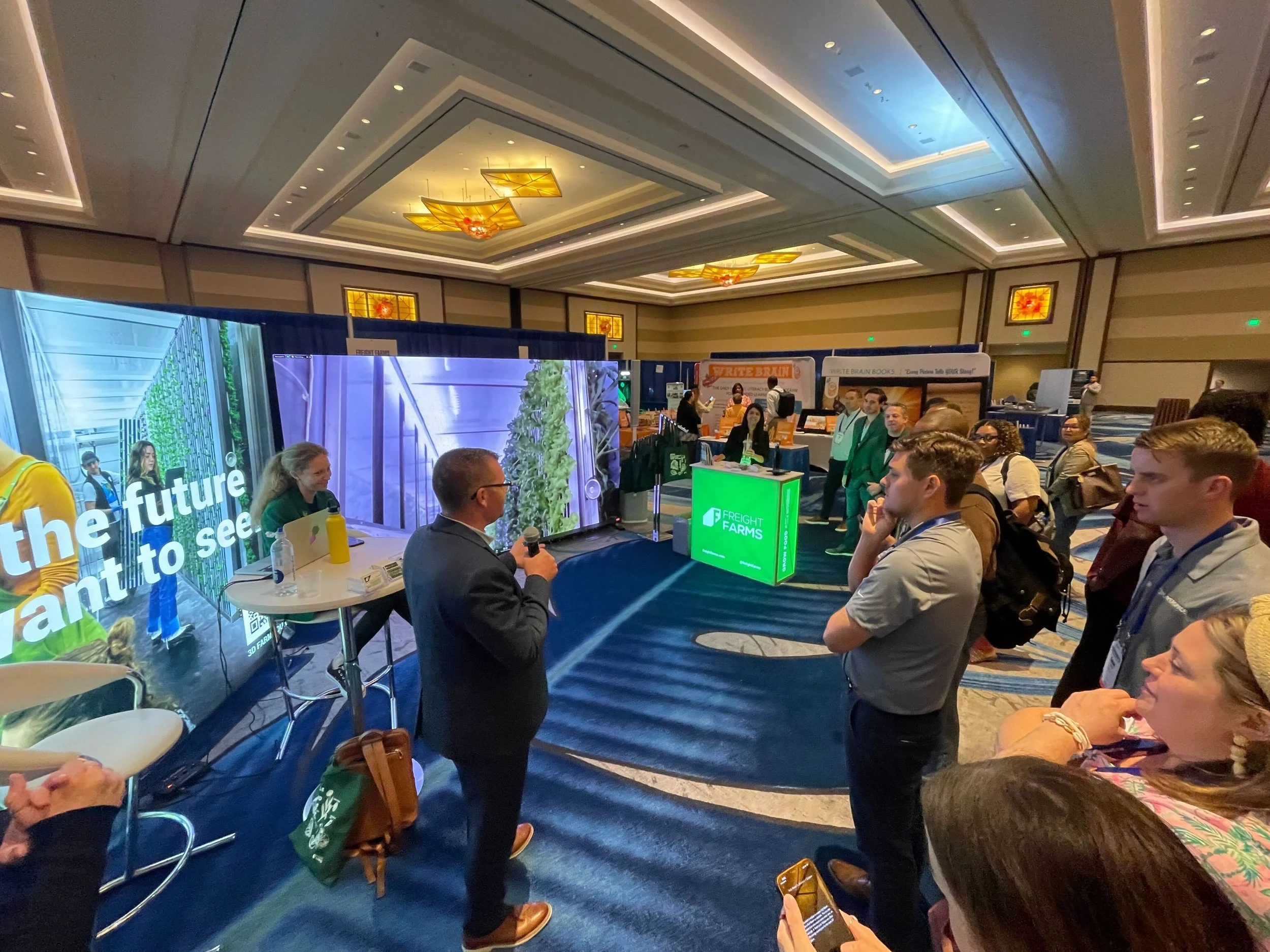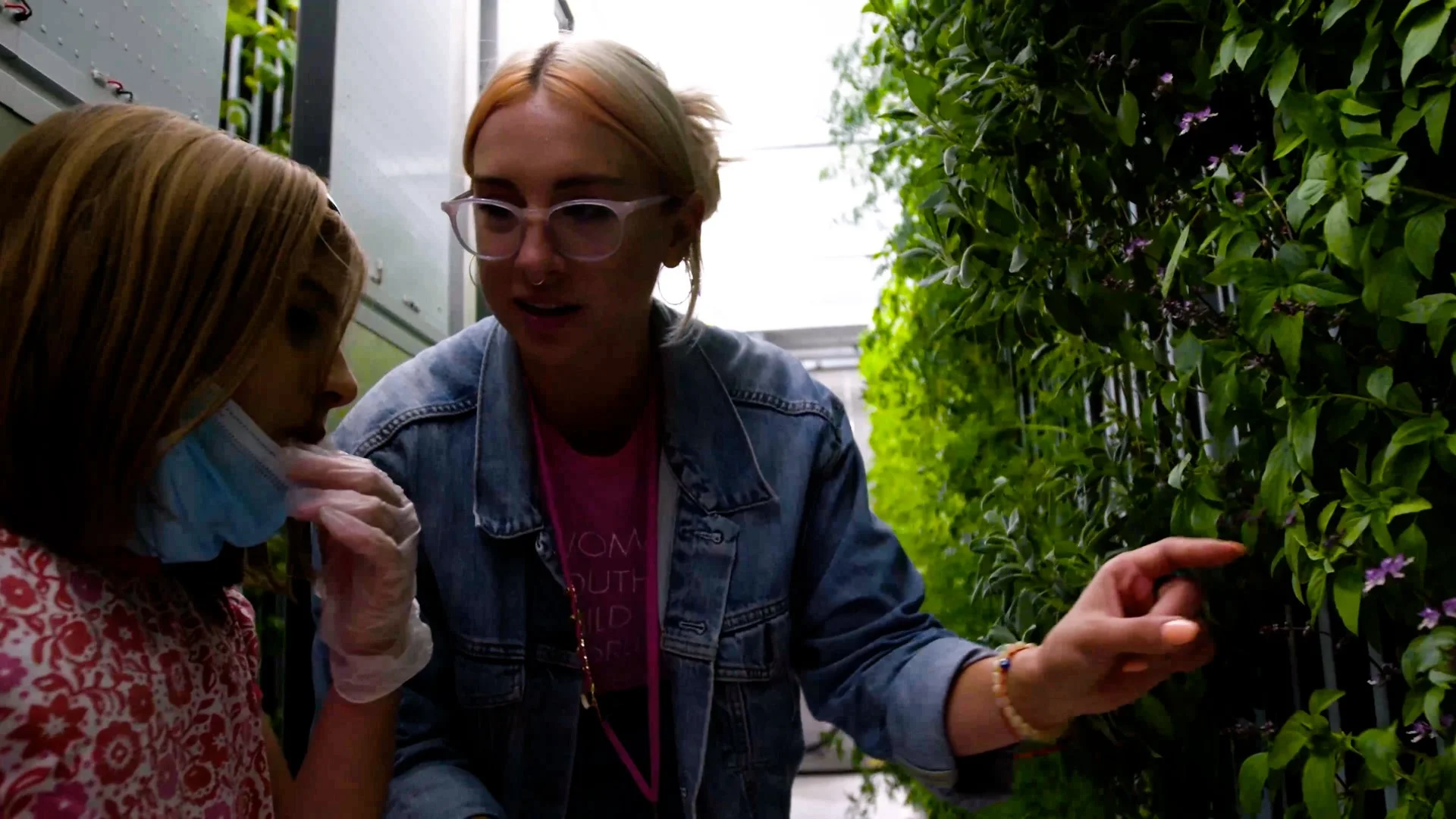Do Plants Improve Mental Health?
May is Mental Health Awareness Month
Mental Health Awareness Month raises awareness and conversations about mental health in communities all over the country. For us at Freight Farms, this is a chance to explore the benefits of plants on mental health.
The month of May (especially here in Boston!) signifies the long-awaited arrival of spring, which brings the opportunity to go outside and enjoy the fresh air and new blooms. For many, the first instinct is to head to the nearest green space — backyard, park, natural trails. This is no coincidence! The phenomenon known colloquially as “forest-bathing” has shown that just the mere presence of trees and plants has a significant effect on our physical and psychological well-being. Observed positive benefits include lower blood pressure, reduced stress hormone production, a boosted immune system, and generally feeling much, much better.
The mind-altering power of nature is not lost on the field of psychology. Horticultural therapy goes back as early as 2000 BC as a method for “soothing the senses.” Ever since, gardens and natural spaces have been used as places of peace and introspection. The practice of modern horticultural therapy, including growing plants to improve mental health, began in 1880 and has become increasingly reputable over the decades; today, experts report many benefits for adults and children with special needs, mentally ill patients of all ages, veterans, the elderly, and other groups.
Using a container farm as a platform for horticultural therapy is just the latest application of this ancient practice. The indoor hydroponic system provides a relaxing and meditative environment and gives the farmers purpose, which in turn produces heightened feelings of self-worth, ability, and self-esteem. The container farm also serves a practical purpose: By being completely independent of the outdoor weather, it’s possible to run these important programs and businesses all year round, without seasonality limiting the benefits of the time spent with nature.
Learn about just six amazing ways individuals and organizations use Freight Farms container farms as platforms for improving mental health.
Employing Adults with Special Needs
“Unemployment for the Autism population is 80–90%, and the jobs available are often meaningless and isolated. We re-designed supported employment, creating a model completely centered around the amazing individuals who work at our farms. We made farming adaptable and fun, with a product that our adults are proud of.”
Zeponic Farms in Springfield, VA
Zeponic Farms was started in 2016 by Zach Zepf to bring local, farm-fresh food to the community while employing and empowering adults with special needs through therapeutic and purposeful farm work.
Zach saw firsthand how his brother Nic struggled to find meaningful work as an adult with autism. Knowing that his brother’s love for gardening would translate well into a farming job, Zach decided to start a farm. Freight Farms was an easy choice: its year-round capabilities ensure full-time employment and the straightforward workflow was a great fit for Nic. Zach partnered with Mason LIFE (a Mason University organization that offers work and educational experiences to individuals with special needs).
The result was a partnership between the newly formed Zeponic Farms and the university, which purchases Zeponic Farm’s greens and integrates them into its food services. Today, Zach employs, supports, and advocates for a team of four adults: Nic, Michael, Mats, and Morgan. The team works together, enjoying time spent with the plants at a job that offers them fulfillment and a sense of purpose.
Helping Veterans Reintegrate
“While I was working on the [hydroponic] system … I would catch myself smiling. I decided to explore this phenomenon more deeply; in talking with several of my clients I learned that many of them experienced the same type of mood shift while gardening. That was the lightbulb moment.”
OD Greens in Willoughby, OH
As an Army veteran and licensed mental health professional, Don Tobul was quick to grasp the benefits of plants on mental health and the potential of farming as a way to help fellow vets find meaningful work and reassimilate into civilian life. The idea was sparked when Don built a DIY hydroponic system in his basement after returning from active duty.
Don realized quickly that while gardening was a valuable therapeutic tool, it was a luxury that not every Ohioan could afford — not to mention the brutal winters that would limit therapy and work to a few months of the year. Through research, Don found Freight Farms and used container farming to bring his mission to life. Today, OD Greens is a successful small business that focuses on occupational development and incorporated work training services for disabled military veterans. He uses the hydroponic system as a platform for experiential education and personal development, with the goal of helping his employees successfully transition back to civilian life.
Pairing Farm Work with Recovery
“We feel it is our calling to one day help serve this community by helping to provide temporary structure and employment to individuals … who struggle to find healthy and meaningful employment while building the foundations of recovery.”
Rally House Farms in Nashville, TN
Long before Rally House Farms was started, David Goodman was doing important community-building work with Rally House Homes, an addiction recovery program that helps men successfully transition back into a substance-free lifestyle.
David always envisioned adding a farming component to the Rally House program, and in 2018, he introduced a Freight Farms container farm to the organization’s programming. The hydroponic container farm was well-suited to the urban Nashville area. It operates as an independent, for-profit business, but the goal is to employ the men staying with Rally House Homes. For these men, farming does not only provide needed structure and empowerment to increase mental health. Growing healthy, local food also helps the men rebuild positive community bonds.
Meaningful Work & Fun
“Our agriculture programs allow us to extend employment opportunities to those of all abilities. We provide our staff with a sense of responsibility, along with new skills to cultivate independence and self-worth.”
The Root Farm in Sauquoit, NY
Just like Zeponic Farms, the Root Farm uses container farming as a way to provide employment to adults that would otherwise have a difficult time finding a job. What's unique to this organization is that they apply the fundamentals of horticultural therapy to a wide range of farming initiatives: In addition to exploring the benefits of plants on mental health through hydroponic and traditional farming, the nonprofit offers chicken coops, beekeeping, maple tapping, and a complete equine therapy program. The farm focuses on both work and fun, with a variety of outdoor and team-building activities offered. All these programs are intended to give staff members and volunteers, many of whom suffer from mental illness or disabilities, a chance to work and thrive in a supportive ecosystem.
Giving Everyone a Chance to Grow
“While healthy eating is important, the farming process — seeding, maintaining, relocating, and harvesting crops — is also a chance for Clubhouse members to work hard, work together, hone new skills, reach goals, and ultimately feel a sense of accomplishment.”
San Antonio Clubhouse in San Antonio, TX
Photo: San Antonio Clubhouse
The San Antonio Clubhouse is a community center for adults experiencing mental illness. The Clubhouse offers volunteering opportunities, counseling, and personal and professional development services to help these adults overcome challenges and gain new skills and self-confidence.
In 2019, the Clubhouse added a Freight Farms Greenery™ to their center. While the farm provides the Clubhouse community with fresh and healthy produce, the real value is in the farmwork itself. The methodical, steady, and repetitive actions required in seeding, harvesting, and transplanting create a meditative rhythm that can soothe anxious minds. The rewarding feeling of harvesting beautiful plants for the larger community creates feelings of accomplishment and confidence, uniting growing plants and mental health.
Fueling Young Minds
“Our mission is to transform the trauma of homelessness into a window of opportunity, where guests can heal old wounds and build resilience for a brighter future.”
Lotus House in Miami, FL
Lotus House, a nonprofit shelter in Miami which provides women and children experiencing homelessness with a holistic rehabilitation center, also incorporates growing plants into their mental health initiatives. In addition to the typical shelter services, the organization offers various programs to help adults and kids heal their wounds and grow.
One such program is the Lotus House Farm, which combines a Freight Farms Greenery with an outdoor rooftop garden to teach the kids about plants, science, farming, and nutrition. The kids help out in the farm — seeding, harvesting, asking questions, and exploring the technology. For these developing minds, getting into a peaceful and unstructured space for a few hours a week can make a huge difference in processing the trauma and anxiety that comes with homelessness. Lotus House hopes to study these effects in their Children’s Wellness Center, which conducts the most widespread research about children and homelessness in the country.
Download our Farm For Good booklet!
Learn more about using a Freight Farm as a mission-based organization. See how container farming technology can be used to create positive change in communities around the world in our Farm for Good booklet.
















